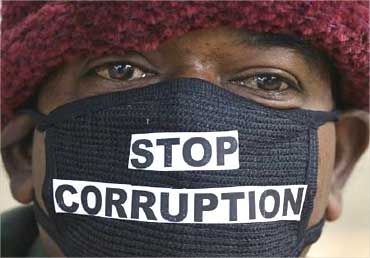 Scrapping the protection given to senior bureaucrats in corruption cases, the Supreme Court on Tuesday ruled that the Central Bureau of Investigation can probe and prosecute them without Centre's sanction, saying that corrupt public servants, whether high or low, are birds of the same feather and must be treated equally.
Scrapping the protection given to senior bureaucrats in corruption cases, the Supreme Court on Tuesday ruled that the Central Bureau of Investigation can probe and prosecute them without Centre's sanction, saying that corrupt public servants, whether high or low, are birds of the same feather and must be treated equally.
Quashing Section 6A of the Delhi Special Police Establishment Act, which makes it mandatory for the agency to get prior approval of the Centre to probe against an officer of joint secretary-rank or above, the court held that the provision hampers impartial probe and protects crime-doers.
The investigating agency has frequently faced problems in proceeding against senior bureaucrats in the absence of government sanction.
"Can there be a sound differentiation between corrupt public servants based on their status? The corrupt public servants, whether high or low, are birds of the same feather and must be confronted with the process of investigation and inquiry equally.”
"Based on the position or status in service, no distinction can be made between public servants against whom there are allegations amounting to an offence under the Prevention Corruption Act, 1988," a five-judge constitution bench headed by Chief Justice R M Lodha said.
It said Section 6-A is "directly destructive" and runs counter to the object the PC Act, 1988 and also undermines the object of detecting and punishing high-level corruption.
The bench, also comprising justices A K Patnaik, S J Mukhopadhaya, Dipak Misra and F M I Kalifulla, said that classification made in Section 6-A on the basis of status in the government service is not permissible under Article 14 (equality before law) as it defeats the purpose of finding prima facie truth into the allegations of graft and it protects crime-doer.
"The purpose of a law may be either the elimination of a public mischief or the achievement of some positive public good. The classification made in Section 6-A neither eliminates public mischief nor achieves some positive public good.”
"On the other hand, it advances public mischief and protects the crime-doer. The provision thwarts an independent, unhampered, unbiased, efficient and fearless inquiry investigation to track down the corrupt public servants," it said.
The apex court said the previous approval from the government necessarily required under Section 6-A would result in indirectly putting to notice the officers to be investigated before commencement of investigation.
"Section 6-A also suffers from the vice of classifying offenders differently for treatment hereunder for inquiry and investigation of offences, according to their status in life. Every person accused of committing the same offence is to be dealt with in the same manner in accordance with law, which is equal in its application to everyone," it said.
"There is no rational basis to classify the two sets of public servants differently on the ground that one set of officers is decision-making officers and not the other set of officers. If there is an accusation of bribery, graft, illegal gratification or criminal misconduct against a public servant, then we fail to understand as to how the status of offender is of any relevance," it said.
The bench said the signature tune in its earlier judgment in Vineet Narain case is, ‘However, high you may be, the law is above you’.
"We reiterate the same. Section 6-A offends this signature tune and effectively Article 14," it said.
"Corruption is an enemy of the nation and tracking down corrupt public servants and punishing such persons is a necessary mandate of the PC Act, 1988.
"It is difficult to justify the classification which has been made in Section 6-A because the goal of law in the PC Act, 1988 is to meet corruption cases with a very strong hand and all public servants are warned through such a legislative measure that corrupt public servants have to face very serious consequences," the bench said.
Image: A protest against increasing corruption in India










